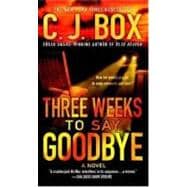
What is included with this book?
C.J. Box is the author of the bestselling, Edgar Award–winning Blue Heaven, as well as seven Joe Pickett novels. His work has won him the Anthony, Macavity, Barry, and Gumshoe awards, as well as the French Prix Calibre .38. He has also been an Edgar Award and Los Angeles Times Book Prize finalist. Open Season was a 2001 New York Times Notable Book. He lives outside of Cheyenne, Wyoming, with his family. Please visit www.cjbox.net.
The New copy of this book will include any supplemental materials advertised. Please check the title of the book to determine if it should include any access cards, study guides, lab manuals, CDs, etc.
The Used, Rental and eBook copies of this book are not guaranteed to include any supplemental materials. Typically, only the book itself is included. This is true even if the title states it includes any access cards, study guides, lab manuals, CDs, etc.